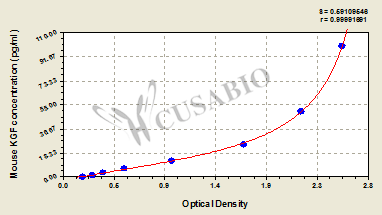This mouse FGF7 ELISA kit employs the quantitative sandwich enzyme immunoassay technique to measure the levels of mouse FGF1 in multiple samples, including serum, plasma, cell culture supernates, or tissue homogenates. It also uses the enzyme-substrate chromogenic reaction to visualize and analyze the analyte levels through the color intensity. The intensity of the colored product is in direct proportion to the FGF7 levels in the sample and is measured at 450 nm through a microplate reader.
FGF7 is a mesenchyme-specific heparin-binding growth factor that stimulates cell proliferation, differentiation, migration, and vascular angiogenesis. Mesenchymal-derived FGF7 binds receptors on epithelial to mediate epithelial-mesenchymal interactions in various organs, including the reproductive tract. FGF7 exerts its effect in a paracrine manner and specifically activates the receptor tyrosine kinase FGFR2IIIb. FGF7 binding promotes FGFR2 dimerization, eliciting several signal transduction pathways, including RAS-MAPK and PI3K-Akt signaling pathways, which play fundamental roles in tumor progression.






